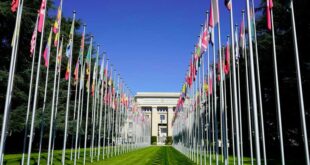The death penalty given to former Egyptian President Mohamed Morsi and all the leaders of the Muslim Brotherhood (MB) will certainly lead to an increase in violence, hence an additional tightening of security measures in Egypt. One day after a judge issued the mass death sentence for the 107 defendants, six other Islamists, convicted of attacking and killing two army officers, were executed. The six were accused of being members of Ansar Bait Al Maqdes (ABM), an ISIL offshoot in the North of Sinai. The response to Morsi’s execution sentence was prompt. Three judges were shot dead by a group of armed men in the North of Sinai few hours later.
It is widely expected in Egypt that the death sentences will not be carried out quickly, if at all. There is some speculation about the government’s intentions to use these death sentences as a bargaining chip with the MB to force them to accept a deal that they presently see as a total political surrender.
Where will this substantial escalation fit in the general picture in Egypt today? There are two views in regard to this question. The first is that Egypt’s authorities are increasing the pressure on the MB, knowing that there are no major risks that the situation will get out of control yet. The second is that the steps taken by the Egyptian State agencies are not totally subject to any tight control from the center of power—that is, the President. This leads to steps that are not well calculated or directly inspired by the President in any literal way.
It is common to resort to the first view for an answer to the above mentioned question. Yet, the second should not be disregarded. In fact, the current conditions of Egypt’s State machine loom large in the picture of Egypt at this critical moment and may decide the future course of the country. While the role and conditions of the State machine at present can partially explain the recent collective death sentence, the explanation actually transcends this particular moment and emerges now as a decisive aspect that may shape Egypt’s future.
In other words, the sentencing of Morsi and his men provides an opportunity to examine the dynamics of the current relation between the central power in Egypt and the State machine.
The shock of the popular revolt in 2011 left some considerable cracks in the State structure. But it was soon glued back together on the basis of a relatively different design. The sense of purpose that gathered the components after the election of Morsi was centered on one objective—getting the MB president out of office.
During the Morsi presidency, the cohesion of the most critical State agencies was generated by the old and effective systems of loyalties and division of privileges, and most relevant government bodies played varying roles in getting Morsi to fail and then be toppled. Security, police, media, the business community and judiciary participated in this complex “operation” that led to the popular overthrow of Morsi, who made their job easier with his, and the MB leaders’, systemic mistakes.
These agencies regarded the MB as an imminent threat to their privileges and modus operandi. The MBs started appointing their men in critical government bodies. The reference points of loyalty were different and the old interests seemed to be forced by the momentum of the popular revolt to give valuable space to the new ones. But they did not do that for long. Based on Morsi’s mistakes, the population was mobilized in a huge protest that made toppling the MB president extremely easy.
But when the show was over, everyone in the orchestra wanted to be paid. The payment is always thought of as an increase in authority, a larger turf, and a more distinguished place in the structure of the state which usually brings larger benefits and privileges. This produced a picture of almost permanent confrontation between the different groups of interests: the Judiciary clashing with the police, the police clashing with the Army, the business community rejecting Al Sissi’s call to contribute to getting the country out of its hardship, and the media vulgarly flattening its message to an empty discourse of propaganda.
Al Sissi saw it as it was. However, his choices were limited. He could either use his popularity as a counter balance to the negative influence of the State interest groups and enforce discipline on the State machine through harsh administrative procedures, or try to accommodate these groups and try to convince them that the regime’s sensitive situation didn’t allow any action that would rock the boat which carries everyone.
Al Sissi chose the second path, that of avoiding any harsh measures to discipline the components of the State machine. There was a reason for this choice. Al Sissi realized that the MBs still represent a danger, therefore he needs the police, the media and the Judiciary. He also understood how bad the economic situation was. Therefore, he was very cautious not to go too far in his approach to the business community. He instead focused on moving the dysfunctional economy.
Though this choice looks logical in appearance, it has a steep price for the President to pay. The State machine, with its in-fighting and relentless attempts to expand its privileges, is alienating the population and intensifying the popular sense that nothing is happening at present that is different than what happened during the years of Mubarak. The behavior of the State machine, in other words, is shortening the time allowed for Al Sissi. Attempts by the State agencies to give a different impression through media shows are not effective.
Therefore, while Al Sissi himself is fighting to move the economy, his main tool—that is, the State machine—is unintentionally shaking the President and the whole boat in the heat of its rush to get a larger cut of influence, with disregard for the sensitivities of the population.
Sentencing Morsi and his men and other excessive security measures are considered a sign of uncoordinated initiatives to annihilate the MB done by a self-defending and always demanding State apparatus. This view sees President Abdel Fattah Al Sissi pointing only to the general direction of reducing the level of decisively confronting the organization. The self-motivated, zealous State machine is simply outdoing itself in the job, with great self-satisfaction, to prove its utility and loyalty, or to help terminate an adversary that represents an existential threat to the current occupiers of the State structure, and hence, to the privileged positions of the members of the concerned State agencies. They all understand that if the MB organization is able to rule the country again, it will crush those who helped topple it the first time without mercy, and will rebuild the machine with bricks of its own making.
The question is not whether Al Sissi is responsible for this disarray and excesses, or not. Of course he is. He is the President. The real point is to understand, without empty rhetoric, why this all is happening. It is very clear that it is damaging Al Sissi’s stand inside and outside the country. Yet, it is turning to be a way of life in Egypt. Explanations went as far as saying that the President intentionally prolongs the rope to the corrupt State figures in order to get the population to move against them, hence help him breaking their role. This explanation does not make sense, however, as the first looser in this scenario will be Al Sissi himself. Furthermore, the population will support Al Sissi anyway if he seriously moves to discipline the State machine.
The Judiciary does not need to be told by Al Sissi to give the MBs death sentences. They will do it without anyone telling them. The police do not need to be told to use maximum and brutal force against the MBs. After all, that organization was the one that burned all the police stations during the revolt of 2011. The same goes for every branch of the State machine.
Under such circumstances, it will be hard to control the movement of this State machine that moves aggressively to expand its turf and wildly hunts the MBs. Overdoing that with disregard for laws and cultural norms provokes the population. It gradually pulls the carpet out from under the Egyptian President’s feet. This is coupled with a renewal of the push to revive the image of former Prime Minister and runner in the Presidential elections General Ahmed Shafiq to become a president instead of Al Sissi. Posters appeared in the streets of Cairo during this month carried the picture of Shafiq with “You are the President” written in big letters under it. Al Sissi’s concessions to the state agencies may be an attempt to consolidate his camp to prevent another “institutions’ figure” from appearing as a serious competitor.
Briefly said, Egypt is now going through an extremely tough period. The economy is moving slowly, particularly with the revenues of tourism being almost non-existent. Security measures reach some ridiculously high levels. Police extrajudicial practices are the rule. Government bureaucracy is a half-dead body that the country has to carry and move with.
Politically, the MBs are still isolated. Yet, this isolation is not a static given. That is to say that the degree of decrease in the MBs’ popularity is tied to the increase in Al Sissi’s popularity. The latter is a function of the population’s perception about the direction of the country under the President. In other words, the more confident Egyptians feel about what Al Sissi does, the less popular the MBs become.
To a certain degree we can place the present general sentiments of the population at the point where they are still generally supportive of the President. Yet, this support is less than what it was a year ago. Everyone who is following what happens in Egypt knows that Al Sissi is in a race with time. The nature of the race does not help him much. His starting point was an almost non-functional economy, and total social and administrative chaos. His “tools,” that is, the State machine, are suffering an increasing lack of discipline.
As long as the President cannot keep the steps of the State machine synced to his drum, such a machine turns into a liability that costs Al Sissi valuable political capital. If the population continues to see this machine behaving irrationally and turning to more oppressive measures than those of Mubarak, and if the promised economic improvements are delayed for whatever reason, the MBs may be helped by their very enemies to break their isolation.
Al Sissi has to shed his caution, count on the support of the Egyptians, and start the long delayed job of disciplining and reorganizing the State machine—particularly the police and Judiciary. Egyptians, in 2011, wanted a police that abides by laws and a Judiciary that is apolitical, clear of corruption and fully independent. Achieving that will help Al Sissi substantially. Egyptians understand very well the depth of corruption in both agencies. It will be the utmost blow to the MB if the President cleaned both agencies of all those who appeared to be racing to serve him while they were actually serving themselves. That would be a real enhancement of the essence of true governance and statesmanship. Furthermore, a modern and law-abiding State machine unleashes all the potentials of the economy.
The Egyptian President is already popular. He does not need the advertising agencies nicknamed TV channels and newspapers. His main ally is the population, if this population were really allowed to become an active part of the equation. To ask the population to be patient while oppressing them for no real reason, other than to place certain State apparatus as “Masters,” is self-defeating tactics.
Time is running out.
 Geostrategic Media Political Commentary, Analysis, Security, Defense
Geostrategic Media Political Commentary, Analysis, Security, Defense





